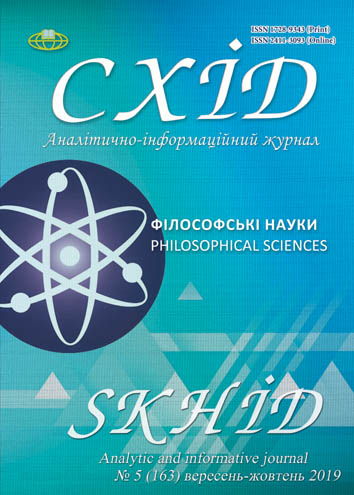Philosophical perspective on the humanization through a prism of the civilizing process (based on socio-anthropological ideas of N. Elias and M. Foucault)
DOI:
https://doi.org/10.21847/1728-9343.2019.5(163).180789Keywords:
civilizing process, humanism, humanization, culture, genealogy, power discourse, discipline, rationalityAbstract
The purpose of this publication is to considering the relationship between humanization and civilizing process, informing by Elias’s and Foucault’s studies. Theoretical basis of this research is founded on comparative analysis, phenomenological approach and generalization. Originality of this exploration is to the discovering of the similarities and also differences in Elias’s and Foucault’s viewpoints on civilizing process in the context of clarifying the basic meanings of humanization. Conclusions. As we believe one can point to some similarity in anthropological and sociocultural views of Elias and Foucault. First and foremost, both of them supported the thesis about of mutability of so-called human nature, that is, its conditionality by structural social changes. Secondly, Elias and Foucault are confident in that the history of cultures (“civilizations”) is to the history of institutional struggle against human impulses and drives with a goal of their “modeling” in accordance with conventional social imperatives. Not only Elias, but also Foucault’s post-structuralism call under question the civilizational interpretation of culture as such, that is any attempt to perspective on culture as a product exclusively of certain religious ideals and tradition. Elias proved convincingly that culture also depends on real social landscape, essential transformation of that does impact on essential transformation entire value system. And finally, within framework of these studies, the cultures are considered from point of view the degree of their civilizing in the sense of “humanizing”, that is defined by them, first of all, as a long process of rationalization of behavioral patterns in terms of the strengthen of affective control and self-constraint, and also as cultivating a specific aversion to the pain in its both physiological and moral meanings. In other words, the attitude of society and its culture to violence is the most significant marker of the level of its civilization, hence its humanization.Downloads
References
Binkley, S., Dolan, P., Ernst, S. & Wouters, C. (2010). The Planned and the Unplanned: A roundtable discussion on the legacies of Michel Foucault and Norbert Elias. Dublin Institute of Technology, Foucault Studies, (Vol. 8), 53-77. (in English)
Cavalletto, G. (2016). Crossing the Psycho-Social Divide (Freud, Weber, Adorno and Elias). London: Routledge (in English)
Chita, Dan Alexandru (2012). The Birth of the Subject: Michel Foucault and Norbert Elias. Hermeneia: Journal of Hermeneutics, Art Theory & Criticism, 12, 163-177. (in English)
Elias, N. (2001). The Civilizing Process: Sociogenetic and Psychogenetic Investigations, (Vol. I). Moscow; St. Petersburg: University book. (in Russian)
Elias, N. (2001). The Civilizing Process: Sociogenetic and Psychogenetic Investigations, (Vol. II). Moscow; St. Petersburg: University book. (in Russian)
Ishchenko, O. (2016) Social and structural dependence of European cultural tradition. Herald of Kyiv National University of trade and economics, 2 (106), 96-108. (in Ukrainian)
Jimenez-Lopes, E. (2017). Constructive exploration among minds that recognize the civilizing Crisis: Searching to create a humanized civilization / IS4IS 2017 GOTHENBURG-CONFERENCE FLYER. (in English)
Paulle, B., Emirbayer, M. (2016). Beneath rationalization: Elias, Foucault, and the body. European Journal of Social Theory, 19, 39-56. DOI: https://doi.org/10.1177/1368431015602355 (in English)
Sajtarly, I. (2019). The psychological structure of individual as a subject matter of the postmodern socio-cultural analysis. Herald of Kyiv National University of trade and economics, 1 (123), 69-79. doi.org./10.31617/visnik.knute.2019(123)06 (in English)
Foucault, M. (1977). Discipline and Punish: The Birth of the Prison. New York: Pantheon Books. (in English)
Downloads
Published
How to Cite
Issue
Section
License
Copyright (c) 2019 Inna Sajtarly, Olena M Ishchenko

This work is licensed under a Creative Commons Attribution-NonCommercial-NoDerivatives 4.0 International License.
1. Authors bear responsibility for the accuracy of facts, quotations, numbers and names used.
2. Manuscripts are not sent back.
3. The publisher does not always agree with the authors' opinion.
4. The authors reserve the right to authorship of the work and pass the first publication right of this work to the journal under the terms of a Creative Commons Attribution-NonCommercial-NoDerivatives 4.0 International License. This license allows others to distribute (copy) the published work for non-commercial purposes, provided there is mandatory attribution to its authors and a link to the first publication in our journal.
5. The authors have the right to conclude separate supplement agreements that relate to non-exclusive work distribution in the form in which it has been published by the journal (for example, to upload the work to the online storage of the journal or publish it as part of a monograph), provided that the reference to the first publication of the work in this journal is included.

